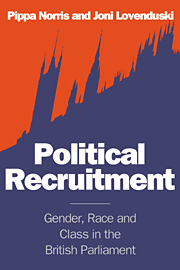Book contents
- Frontmatter
- Contents
- List of figures
- List of tables
- Preface
- 1 Puzzles in political recruitment
- Who selects and how?
- Who gets selected, and why?
- 6 Supply and demand explanations
- 7 Gatekeeper attitudes
- 8 Candidate resources
- 9 Candidate motivation
- 10 Comparative candidate recruitment
- Does the social bias matter?
- Appendix A Details of the survey design and sample
- Appendix B Questionnaires
- Notes
- Bibliography
- Index
9 - Candidate motivation
Published online by Cambridge University Press: 07 December 2009
- Frontmatter
- Contents
- List of figures
- List of tables
- Preface
- 1 Puzzles in political recruitment
- Who selects and how?
- Who gets selected, and why?
- 6 Supply and demand explanations
- 7 Gatekeeper attitudes
- 8 Candidate resources
- 9 Candidate motivation
- 10 Comparative candidate recruitment
- Does the social bias matter?
- Appendix A Details of the survey design and sample
- Appendix B Questionnaires
- Notes
- Bibliography
- Index
Summary
Motivation – political ambition, drive, determination – could be expected to play a critical role in recruitment. As one MP expressed the drive: ‘It was a longterm aim to be a Member of Parliament, and I devoted a hell of a lot of mental energy to that because you don't get there if you don't’. Most British citizens are legally qualified to stand. There are thousands of lawyers, teachers and company directors in brokerage occupations with sufficient career flexibility, financial security and leisure time to run for elected office. Many have experience on the first rungs of the political ladder, in party office, local government, voluntary groups, and public bodies; there are about 100,000 elected local councillors in Britain. And many have good local networks among community groups, business associations and trade unions. Yet few seriously consider a parliamentary career, while even fewer run. Conservative Central Office receives only 2,000 applicants every election from a pool of about 750,000 members. Why? In the supply-side model developed earlier a combination of motivation plus resources produces the necessary and sufficient conditions for pursuing a political career.
The aims of this chapter are threefold. First, to consider alternative ways of understanding political motivation based on biographical, social psychological and behavioural approaches. Second, to analyse whether evidence of drive helps to explain the progressive political ambition of candidates. Lastly, to consider how motivation relates to different underlying notions of political representation in the Labour and Conservative parties.
- Type
- Chapter
- Information
- Political RecruitmentGender, Race and Class in the British Parliament, pp. 166 - 182Publisher: Cambridge University PressPrint publication year: 1994



